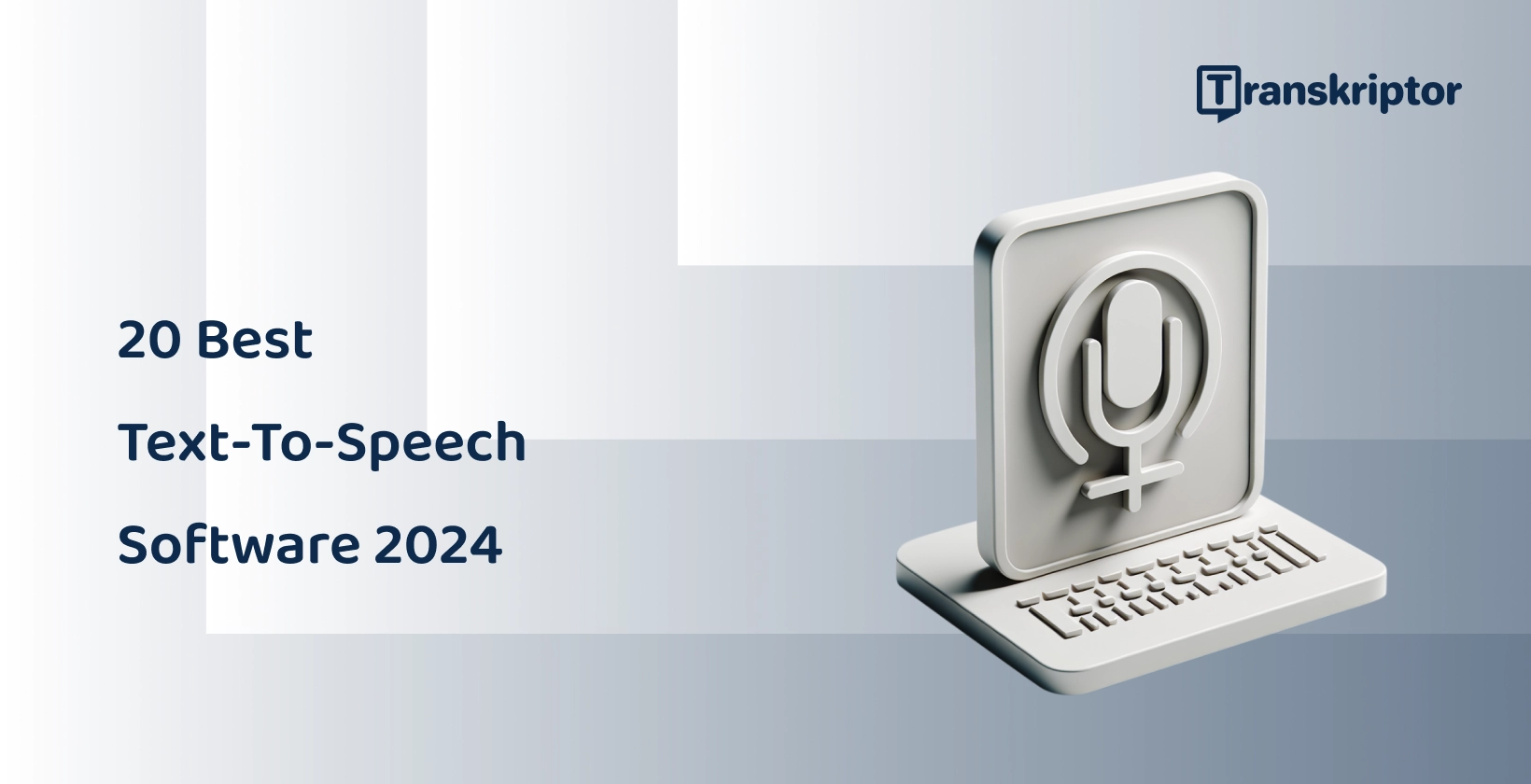The 20 best text-to-speech software are listed below.
- Speaktor: A text-to-speech app that converts written texts into audio.
- Descript: All-in-one software for audio and video recording, featuring AI voice cloning, priced at $144/year or $15/month.
- Synthesia: Text to speech platform with lifelike AI-generated presenters, criticized for pricing.
- Speechify: AI-powered text-to-speech converter with options to add a play button, priced at $139/year.
- Spocket: Platform with customizable text-to-speech features, offering a free trial and plans starting at $39.99/month.
- FlexClip: Web-based text-to-speech tool with 140 languages, priced at $9.99/month.
- Murf: Speech-to-text software with pricing plans from free to $26/month, offering script typing and editing options.
- Amazon Polly : Text-to-speech software with deep learning technology, efficient but charges $4 per 1 million characters of text.
- Lovo: AI-powered text-to-speech software with 500+ voices, offering presets, priced at $19-$24/month.
- Speechelo: Cloud-based voiceover tool with one-time payment of $97 and customizable voice effects.
- Fliki: Text-to-speech tool with 900+ voices in 75+ languages, offering advanced customization at a cost.
- Synthesys: Professional voiceover tool with monthly subscription pricing ranging from $29 to $59.
- Play.ht: AI voice generator with over 900 voices and pricing plans starting at $39/month.
- NaturalReader: Free text-to-speech tool with limitations, premium subscription at $49/month for more access.
- Nuance Dragon: Text-to-speech technology for customer service and brand representation.
- Azure Text to Speech: Developer-oriented speech synthesis with customizable voices and controls.
- Voice Dream Reader: Mobile text-to-speech app for Apple users, priced at $9.99.
- Listnr : AI voice generator with pricing starting at $7.50/month, criticized for slow and robotic speech.
- FreeTTS: Text-to-speech platform with a free tier and a $19/month subscription for more features.
- Notevibes : Speech to text software with customization options and pricing at $9/month or $84/year.
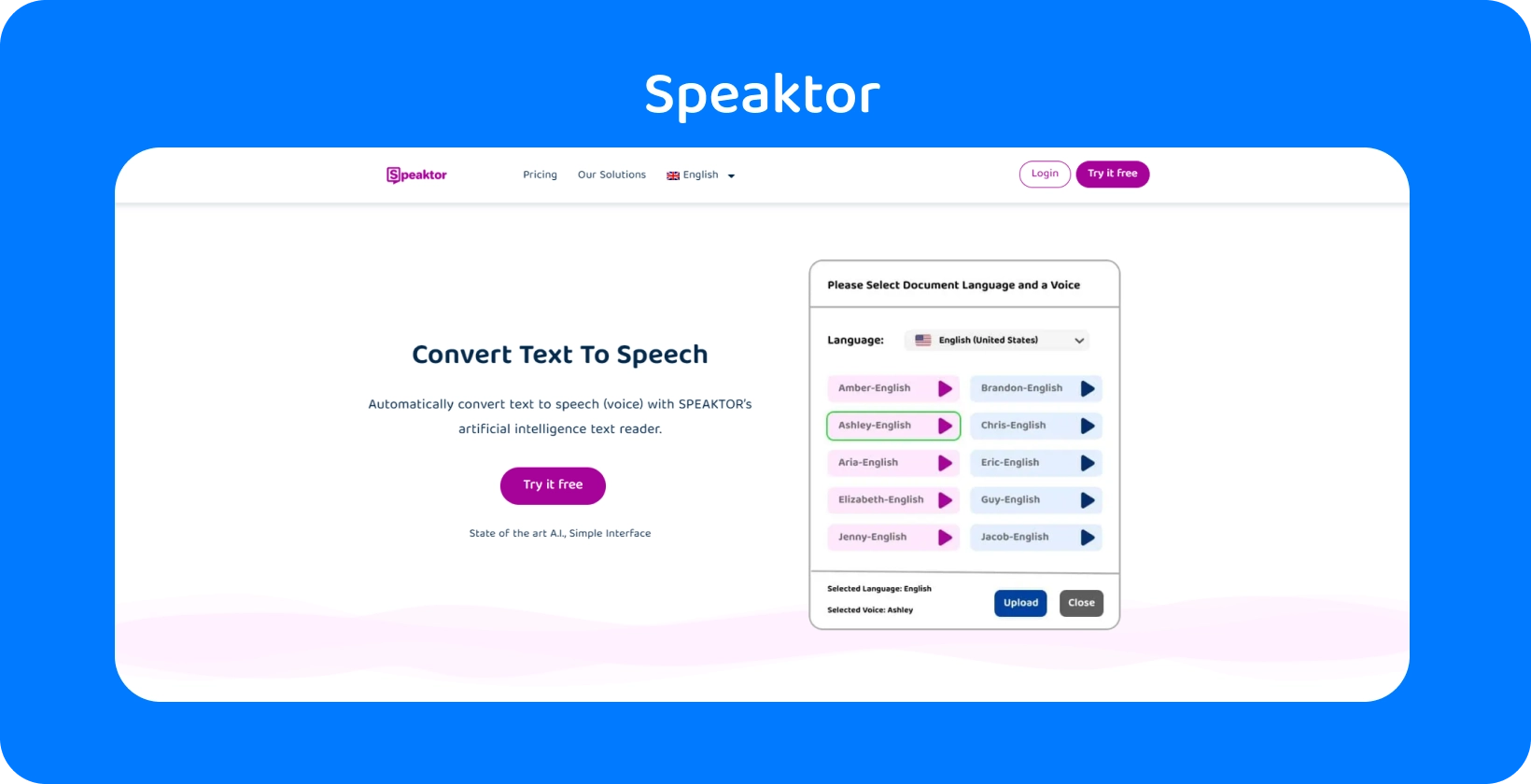
1. Speaktor
Speaktor is a remarkable text-to-speech app that has revolutionized the way users engage with written content by converting it into audible speech. This app leverages advanced text-to-speech technology, making it an invaluable tool for people who prefer auditory learning or need an alternative to traditional reading methods. Its ability to turn academic papers, e-books, and other written content into audio format caters to diverse learning styles and accessibility needs.
A standout feature of Speaktor is its customizable voices and reading speeds. Users are able to choose from a variety of voices to find one that best suits their preference, making the listening experience more comfortable and engaging. The ability to adjust reading speeds is particularly beneficial for learners who need to process information at their own pace, whether they're quickly reviewing materials or delving into complex topics more slowly. Explore the benefits of Speaktor with a free trial by clicking here .
2. Descript
Descript is an all-in-one software used for recording sound for audio and video projects. Descript has a built-in text to speech generator which uses speech data to clone the user’s voice, so they are able to add audio to projects without having to record. The basic price plan costs $144 annually or $15 per month, and the pro plan costs $288 annually or $30 per month.
Descript is a high-quality software with the price tag to match, offering benefits like AI voice cloning which allows the user to replace incorrect audio without re-recording, and exporting work in several formats. The advanced features that Descript offers mean users take longer to learn how to use the software, which uses valuable time and energy.
3. Synthesia
Synthesia is a text to speech platform which generates realistic speech for videos in a handful of minutes. Synthesia offers lifelike AI-generated presenters which appear in tandem with the speech to narrate the text, with diverse English accents, different genders and natural-sounding tones.
Synthesia only supports one audio track per project, and users are unable to add third party audio content. Synthesia is best suited for developing training and product videos. Customers criticize Synthesia’s pricing plan, which jumps from $29 per month for the Starter plan to a company pricing structure for the Enterprise plan with no middle ground.
4. Speechify
Speechify is an AI-powered text to speech converter, with both a free version and a paid version costing $139 a year. Speechify takes any digital text, whether that is a document, PDF, or email, and creates a voice-over. Speechify allows users to add a ‘play’ button to content on their website or app, with options to adjust the reading speed to their preference, in addition to a scanning feature which converts printed text into speech.
5. Spocket
Spocket is a platform with a unique text-to-speech feature. Users are able to customize voice and language preferences on the Spocket platform, as well as control playback speed and skip articles. Spocket offers a free plan, a starter plan costing $39.99 a month and a pro plan costing $59.99 a month. Users criticize the high price of the basic subscription, overlooking the fact that each plan comes with a 14-day free trial.
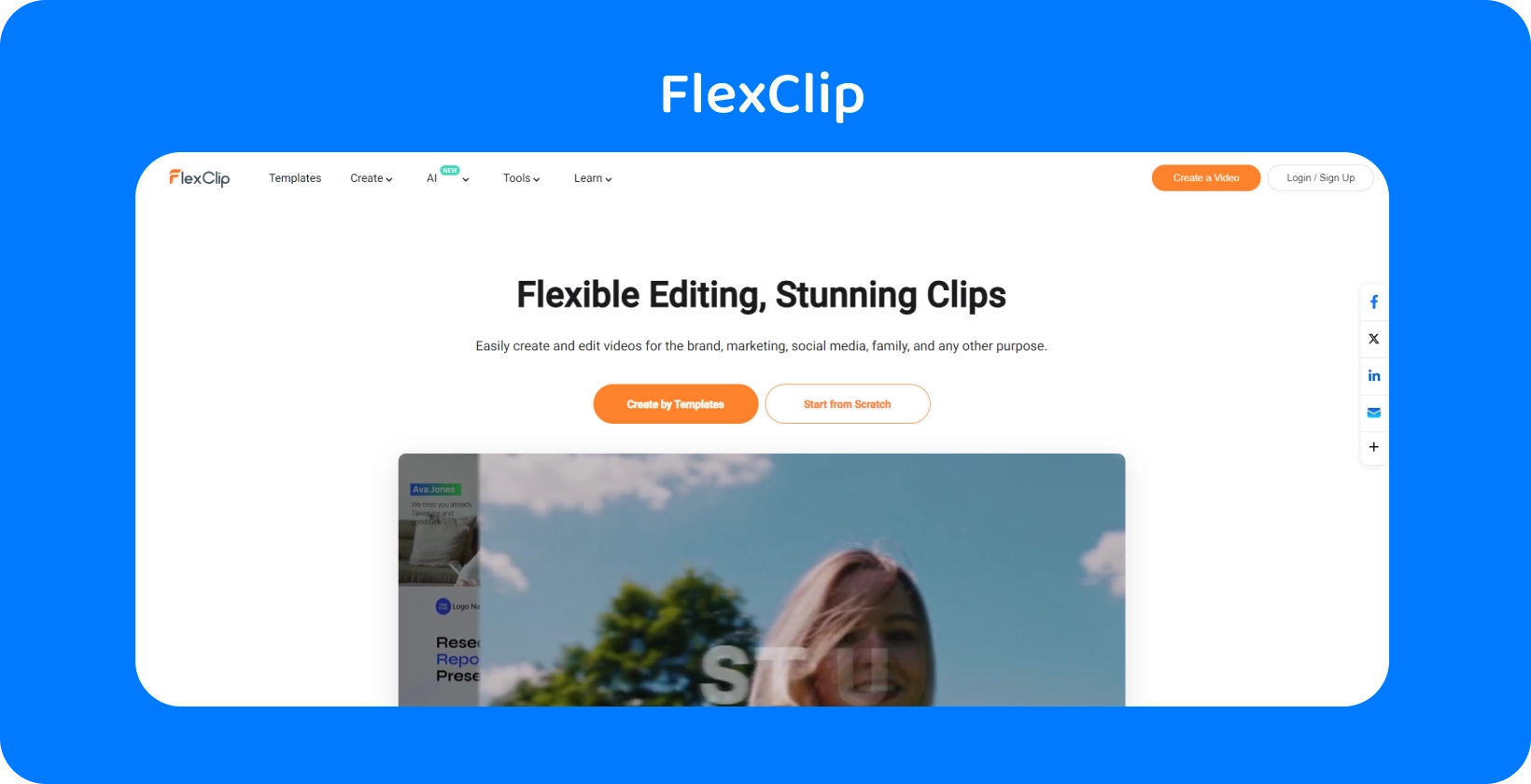
6. FlexClip
FlexClip is a web-based text to speech tool, with 140 different languages and 400 voices, costing $9.99 per month or $19.99 per month for the business plan. Users are able to adjust the pitch and sound of the speech to convey the desired tone.
Users praise FlexClip for being simple yet capable, as the basic text to speech tool has an impressive choice of accents, voices and styles which make adding audio to a project incredibly straightforward.
7. Murf
Murf is a speech-to-text software designed to create voice-overs for digital resources, videos and presentations. The three main pricing plans offered by Murf are the free subscriptions, the basic subscription costing $13 per month and the pro subscription costing $26 per month. There are two options for inputting text in Murf, typing the script or uploading a recording which it then transcribes and turns it into an AI voice speaking, to create the voice-over.
Murf has options for additional editing, like a grammar checker which vets the script and trimming capabilities, but the software doesn’t allow users to go in and manually fix any inaccuracies.
8. Amazon Polly
Amazon Polly is a text to speech software add-on which allows users to create applications that speak. The text to speech within Amazon Polly relies on deep learning technology to produce lifelike speech. The three types of voices offered by Amazon Polly are narrative, conversational and custom, the last of which requires the business working with the team to build a voice exclusive to an organization.
Amazon Polly has a free version, but it also has a pay-as-you-go tier which charges $4.00 per 1 million characters of text that the user converts to speech. Amazon Polly is incredibly efficient, converting even large blocks of text into speech in less than a second, even if the generated voices don’t sound entirely natural.
9. Lovo
Lovo is an AI-powered text to speech software offering more than 500 voices in 100 languages, designed to make video voice-overs. There is a free version of Lovo, as well as a basic and pro software for $19 and $24 per month respectively. Lovo offers 30 presets to convey different emotions.
The AI voices provided by Lovo are already incredibly realistic, but the app still has options to adjust the speed on a word and sentence level. Lovo has limited language coverage, with users reporting that non-English languages often sound robotic.
10. Speechelo
Speechelo is a cloud-based voiceover tool, which allows the user to change the tone, speed and pitch of the speech, as well as offering breathing and pausing effects to increase the authenticity of the voice. Speechelo forgoes a monthly subscription, offering instead a one-time payment of $97 with a 60-days money-back guarantee.
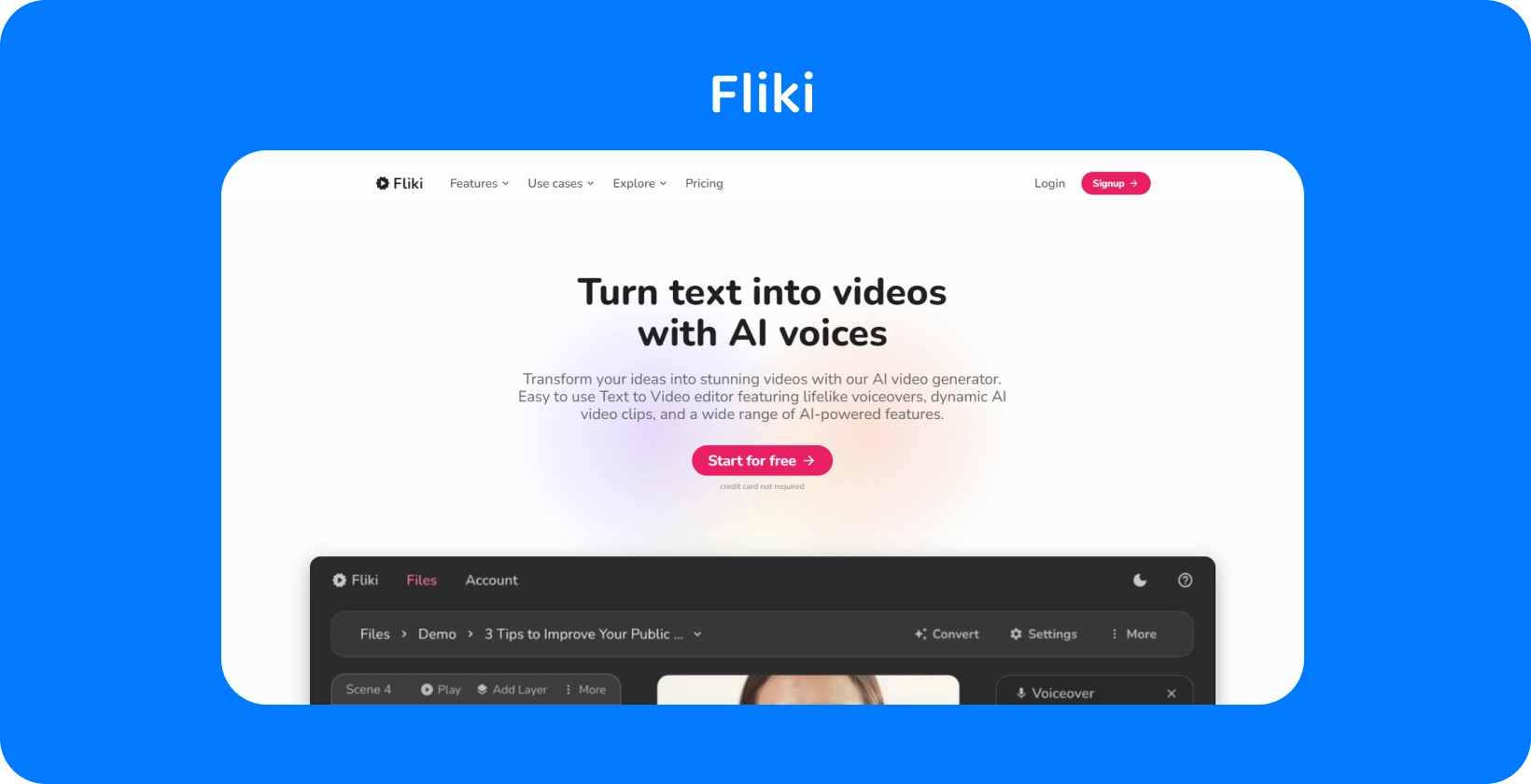
11. Fliki
Fliki is a text-to-speech tool with extensive language and accent coverage, boasting more than 900 voices in over 75 languages and hundreds of accents. Fliki has a standard subscription costing $21 per month and a business subscription costing $66 per month. Fliki is incredibly versatile, as users are able to adjust pitch, tone, and add emotion to the generated audio, and has a straightforward interface. Fliki is a premium text-to-speech solution, but prospective customers report being off put by the cost.
12. Synthesys
Synthesys is a professional voiceover tool, which works by first asking the user to choose the preferred gender, style, accent and tone for the generated voice, and second asking them to input the text. The monthly subscription to Synthesys ranges from $29 to $59 per month. Users report two main limitations: the 1000-word limit on input texts and the long rendering process.
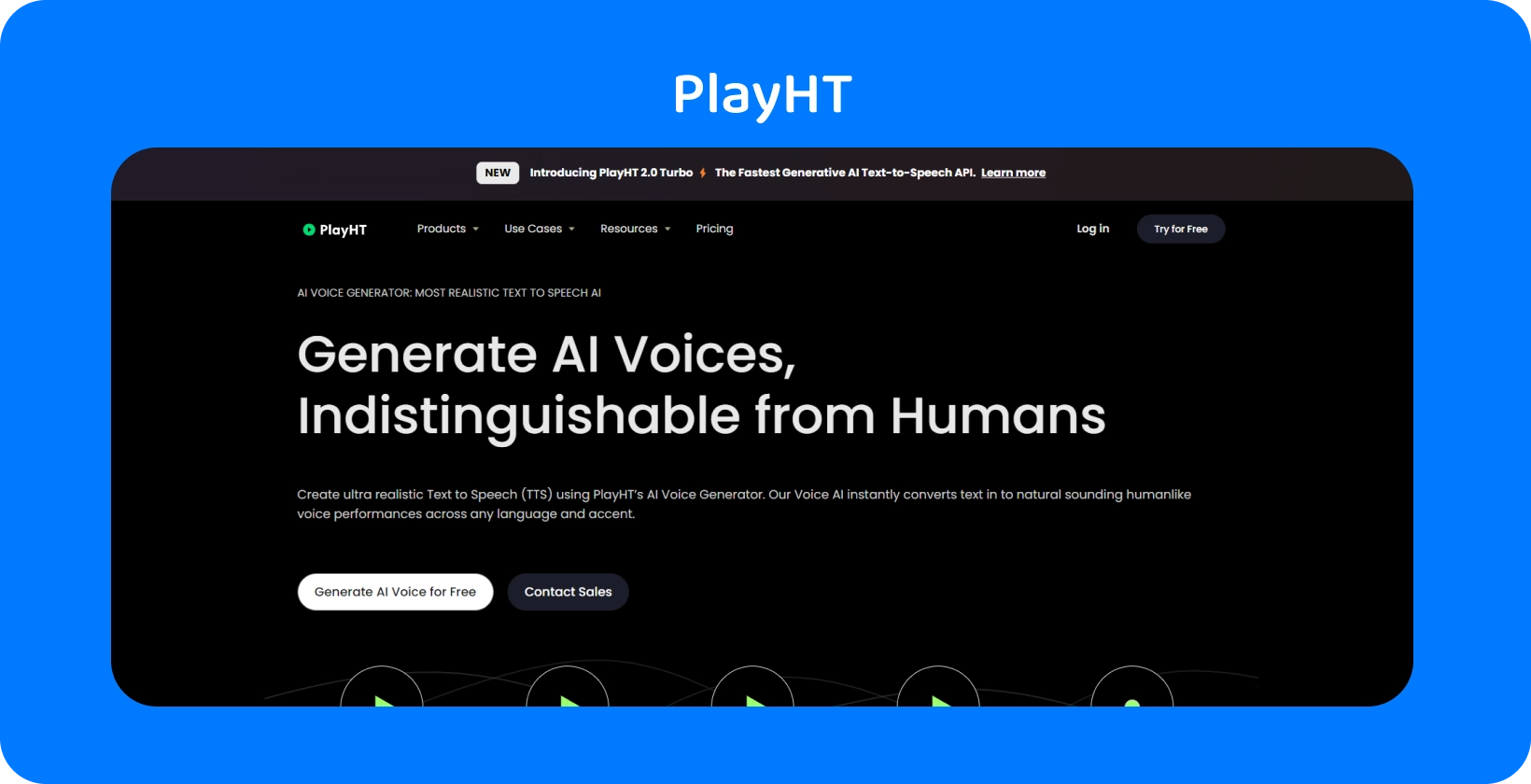
13. Play.ht
Play.ht is an AI voice generator, designed for conversational AI, narration and voicing characters. Play.ht offers over 900 voices in 140 languages, as well as many types of export file format. The Play.ht free subscription is followed by the professional plan at $39 per month, and the premium plan at $99 per month.
14. NaturalReader
Natural reader is a completely free text to speech tool, designed for dyslexic readers and foreign language learners. NaturalReader is able to scan text on physical documents and convert it to speech, as well as documents loaded directly into its library. Free users are only able to sample the premium voice options for 20 minutes per day, so they have to stretch to the $49 per month subscription if they wish to use more.
15. Nuance Dragon
Nuance Dragon offers text-to-speech technology for customer self-service, training the voices with dialogue to mimic live agents. Nuance TTS reduces costs by automatic calls and provides a unique realistic voice to represent the brand.
16. Azure Text to Speech
Azure Text to Speech is for developers who want to program speech synthesis into their applications. Azure offers lifelike speech, customisable voices and fine-tuned audio controls across 110 voices and 45 languages, giving the user ultimate control.
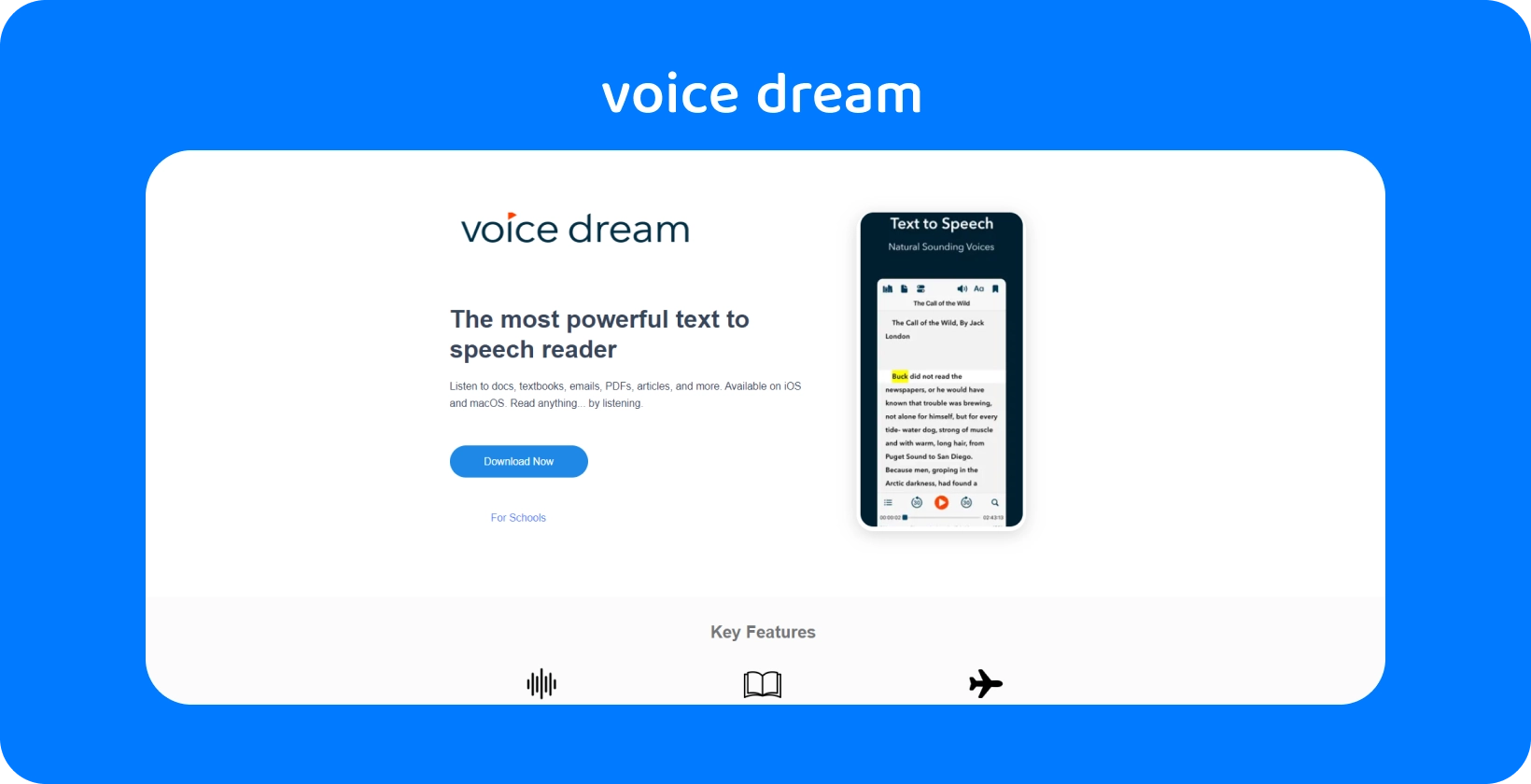
17. Voice Dream Reader
Voice Dream Reader is a mobile text-to-speech app, costing $9.99 in the US app store,, primarily designed for Apple users who are able to access the full range of functions. Voice Dream Reader offers 30 languages and 200 voices to read PDFs, web pages and E-books aloud.
18. Listnr
Listnr is an AI voice generator, for videos, digital resources, podcasts and voice assistants. The pricing for Listnr starts at $7.50 per month with the Solo plan, and $16.60 per month with the Pro plan. Listnr allows users to insert a link to a webpage, as well as pasting text into the generator, from which it automatically detects text and creates the narration. Users report that the speech is slow and slightly robotic at times despite offering editing options after the speech is generated.
19. FreeTTS
FreeTTS is a text to speech platform, for creating e-learning modules, audiobooks and making any digital content more accessible. FreeTTS removes audio files within 24 hours of their creation, ensuring privacy. The free FreeTTS subscription supports the conversion of 10,000 characters to speech every month, in multiple languages and voices, but users have to pay $19 per month to access more.
20. Notevibes
Notevibes is a speech to text software with a free and paid ($9 per month or $84 per year) version. Notevibes offers users the option to customize pronunciation in addition to offering 177 unique voices that speak in 18 languages. It is an important aspect when the software is being used to learn a language.
Users praise Notevibes for the numerous voices offered, but the platform also has a steeper learning curve and takes longer to get to grips with due to advanced options. The app is multi-use due to the array of features offered by Notevibes, from small personal projects to commercial voiceovers for TV.
What is Text-to-Speech?
Text to speech (TTS) is a process of converting words on a computer or other digital device into audio. Text-to-speech software is sometimes called “read aloud” technology, relying on a speech synthesizer system to interpret written text and output it as spoken language.
TTS is helpful for people who have difficulty reading or who prefer auditory learning. Individuals with disabilities such as blindness, dyslexia, or other learning challenges often use TTS to consume digital content. Text to speech is useful for people who are learning a new language, as it allows them to hear the pronunciation of words.
How Does Text-to-Speech Work?
Text-to-speech converts written text into human speech by breaking it down into smaller units of sound and assigning them audio parameters. The audio parameters contain the information needed to generate a waveform, which determines the output speech.
Text-to-speech softwares contain voice generators, which perform the phonetic analysis, breaking down the speech into sentences, words and phonemes, and stringing them together in the structure of waveforms. Text-to-speech softwares contain the necessary information to generate speech which has rhythms and intonations which are believably human.
What is the Accuracy of Text to Speech Softwares?
The accuracy of TTS software is more than 95%. The accuracy varies depending on the quality of the input text and the complexity of the language, as well as the language model and database within the TTS tool. To measure the accuracy of a text to speech tool, listen back to the generated speech and judge how easy it is to understand, how natural it sounds, and how exact the match with the input text is.
How to Choose a Text-to-Speech Software?
To choose a Text-to-Speech software, consider the factors below.
- Define the needs and goals. Determine the primary needed function the TTS software for, such as accessibility, learning, or content creation.
- Consider compatibility. Ensure the TTS software is compatible with the devices and operating systems.
- Assess voice quality and language support. Evaluate the naturalness of the TTS voices and the range of languages available.
- Evaluate customization options. Look for the ability to modify voice types, speaking rates, and intonations.
- Check integration and compatibility. Make sure the TTS software works well with other applications.
- Assess the user interface and ease of use. Choose software with an intuitive interface that simplifies the text-to-speech process.
- Consider mobility and accessibility. Look for TTS software that offers mobile application options and is accessible to individuals with disabilities.
- Examine privacy and security. Research how the software handles the data and if it offers offline capabilities for enhanced privacy.
- Compare cost and licensing. Understand the pricing structure and what features are included with each pricing tier.
- Utilize trial periods and user feedback. Test the software using free trials and read user reviews to gauge satisfaction and performance.
- Investigate customer support and updates. Verify the software provider offers reliable support and regular updates.
- Consider scalability. Evaluate if the software accommodates growing needs and increased usage over time.
- Check backup and export options. Confirm the software's ability to back up the data and export transcriptions in various formats.
- Stay informed about future trends. Keep up-to-date with the latest developments in TTS technology to ensure long-term satisfaction.
What is the Average Cost of Text-To-Speech Software?
The average cost of text-to-speech software is $19 per month for monthly subscription. The cost of Text-to-Speech (TTS) software varies widely depending on several factors, such as the features offered, the quality of the voices, the number of languages supported, the intended use (personal vs. commercial), and the pricing model of the provider (subscription vs. one-time purchase).
